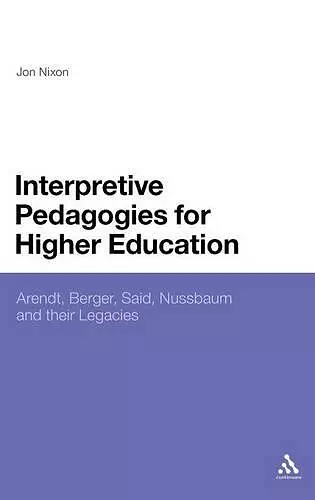Interpretive Pedagogies for Higher Education
Arendt, Berger, Said, Nussbaum and their Legacies
Format:Hardback
Publisher:Continuum Publishing Corporation
Published:22nd Mar '12
Currently unavailable, and unfortunately no date known when it will be back

Draws together pedagogy with practice and explores the pedagogical implications of the work of leading public educators.
Provides a humanistic perspective on pedagogy by relating it to the interpretive practices of particular public educators: thinkers and writers whose work has had an immeasurable impact on how we understand and interpret the world and how our understandings and interpretations act on that world."Interpretive Pedagogies for Higher Education focuses on providing a humanistic perspective on pedagogy by relating it to the interpretive practices of particular public educators: thinkers and writers whose work has had an immeasurable impact on how we understand and interpret the world and how our understandings and interpretations act on that world. Jon Nixon focuses on the work of four public intellectuals each of whom reaches out to a wide public readership and develops our understanding regarding the nature of interpretation in the everyday world: Hannah Arendt's work on representative thinking', John Berger's injunction to hold everything dear', Edward Said's notion of democratic criticism', and Martha Nussbaum's studies in the intelligence of feeling. These thinkers provide valuable perspectives on the nature and purpose of interpretation in everyday life. The implications of these perspectives for the development of a transformative pedagogy and for the renewal of an educated public are examined in relation to the current contexts of higher education within a knowledge society."
‘This book is elegantly written and thought-provoking. Jon Nixon has offered us a desperately needed humanistic perspective on pedagogy and its implications for academic practice and beyond. A must read for those who are genuinely concerned with the current status of higher education.' Feng Su, Lecturer in Education, Liverpool Hope University, UK
‘At a time of significant financial uncertainty for universities and renewed hesitations in government and the public mind about what constitutes public and private interests, this book asks fundamental questions about the purpose and place of higher education in a globalized world. Developing interpretive enquiry within universities is a fundamental condition for creating the intellectual means of living in a "common world". This idea is developed throughout this book, and the case for this fundamental aim for higher education is made with illuminating clarity. Jon Nixon provides the opportunity of a compelling encounter with seminal texts for those seeking to problematize pedagogies and practices in higher education.' Joëlle Fanghanel, Professor of Higher Education, University of West London, UK
‘Considered and considerate: this book from Jon Nixon paints a large and innovative canvas against which to view pedagogy in higher education. In giving us insights into the work of Arendt, Berger, Said and Nussbaum, the creative possibilities of scholarship are revealed, with a new curricula framework unfolding before the reader. It is a work to which I shall want to return.' Ronald Barnett, Emeritus Professor of Higher Education, Institute of Education, University of London, UK
'Nixon shows how the interaction between different fields of expertise provides a means for understanding the globalised world. Nixon's excellent analysis of the work of key public educators and their legacy for higher education invites the reader to think critically about higher education's social role in a democratic society in the era of cosmopolitanism and how pedagogy as a practice can contribute in this. This book is an invaluable read for anyone concerned about the future of higher education in the 21st century.' Tero Erkkilä, Lecturer, Department of Political and Economic Studies, University of Helsinki, Finland
'Drawing inspiration from key thinkers about education and society, he provides the reader with a roadmap which reconnects pedagogy with the public and educative purposes of the university. In so doing Jon Nixon helps to reclaim the notion of the public good in higher education.' Bruce Macfarlane, Associate Professor for Higher Education, University of Hong Kong, Hong Kong
‘By exploring the work of Arendt, Berger, Said and Nussbaum, Jon Nixon offers an excellent analysis on the epistemological and ethical implications of their contributions to the nature of interpretation as well as education. He provides a rich and much-needed conceptual framework for a pedagogical practice at the university, suited to the challenges of globalisation and the further development of democracy in the present and future.' Brigitte Kossek, Lecturer in Education, Center for Teaching and Learning, University of Vienna, Austria
This book is indeed an invaluable read for anyone concerned about the future of higher education in the twenty-first century. Although this book is not intended for theological education audiences, I believe they can use Nixon’s pointed insights to reflect on the challenges of globalization and its dehumanizing ethos for higher educational contexts and for theological school in particular. Theological schools are not exempt from these challenges and they offer both a capacity for embracing that which is just and resisting with hope that which is not. -- Debora B. Agra Junker, Christian Theological Seminary * Teaching Theology & Religion *
ISBN: 9781441117151
Dimensions: unknown
Weight: 426g
192 pages